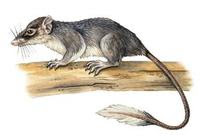This comes from a German study published in the respected PNAS (Proceedings of the National Academy of Sciences), and reported here.
The animal is a pentailed tree shrew in a Malaysian rainforest. The shrew, which has ancestors in common with primates, feeds on the flower buds of the Bertam Palm, with an alcohol content of 3.2%, comparable to a mid-strength beer.

The researchers report the flower's smell as being somewhat like a brewery. They believe the tree had evolved alcoholic nectar to attract animals, so improving pollination.
But the researchers also report that despite spending a couple of hours per night licking the nectar, the animals show no signs of being drunk. The scientists reckon the tree shrews correspondingly developed mechanisms for metabolising alcohol that are different to human processes.
The nett effect is the development of an ongoing evolutionary ecology that is apparently beneficial to both sides, with no ill effects.
Interesting, but can we learn anything from this? If the mechanism is one of elimination rather than simply tolerance, it may be possible to find ways for humans to do the same.
Which is not to say you could then stay intoxicated with no chronic effects, rather that all effects would be removed. This begs the question of whether there is anything addictive in alcohol that is not related to the intoxicative effect; the researchers seem to suggest the treeshrews maintain a relationship akin to addiction.
No comments:
Post a Comment